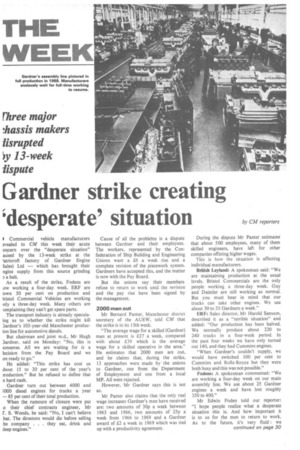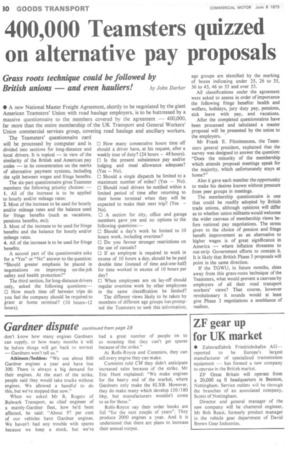Gardner strike creating
Page 30

Page 32

If you've noticed an error in this article please click here to report it so we can fix it.
'desperate' situation by CM reporters I Commercial vehicle manufacturers evealed to CM this week their acute oncern over the "desperate situation" aused by the 13-week strike at the 'atricroft factory of Gardner Engine Sales) Ltd — which has brought their ngine supply from this source grinding 3 a halt.
As a result of the strike, Fodens are LOW working a four-day week. ERF are [own 50 per cent on production and lristol Commercial Vehicles are working ely a three-day week. Many others are omplaining they can't get spare parts.
The transport industry is already speculaing as to whether the strike might kill 3ardner's 105-year-old Manchester producion line for automotive diesels.
But chairman and joint m.d., Mr Hugh ardner, said on Monday: "No, this is ionsense. All we are waiting for is a lecision from the Pay Board and we ire ready to go."
He added: "This strike has cost us ibout 15 to 20 per cent of the year's iroduction." But he refused to define that n hard cash.
Gardner turn out between 4000 and 5000 diesel engines for trucks a year — 85 per cent of their total production.
When the rumours of closure were put o their chief contracts engineer, Mr 1. S. Woods, he said: "No, I can't believe hat. The directors would die before selling he company • . . they eat, drink and deep engines." Cause of all the problem is a dispute between Gardner and their employees. The workers, represented by the Confederation of Ship Building and Engineering Unions want a £6 a week rise and a complete revision of the piecework system. Gardners have accepted this, and the matter is now with the Pay Board.
But the unions say their members refuse to return to work until the revision and the pay rise have been signed by the management.
2000 men out
Mr Bernard Panter, Manchester district secretary of the AUEW. told CM that the strike is in its 13th week.
"The average wage for a skilled (Gardner) man at present is £27 a week, compared with about £39 which is the average wage for a skilled operative in the area." He estimates that 2000 men are out, and he claims that, during the strike, 13 approaches were made by the unions to Gardner, one from the Department of Employment and one from a local MP. All were rejected.
However, Mr Gardner says this is not so.
Mr Panter also claims that the only real wage increases Gardner's men have received are: two amounts of 30p a week between 1963 and 1966, two amounts of 25p a week from 1966 to 1969 and a Gardner award of £2 a week in 1969 which was tied up with a productivity agreement. During the dispute Mr Panter estimates' that about 500 employees, many of them skilled engineers, have left for other companies offering higher wages.
This is how the situation is affecting individual manufacturers.
British Leyland: A spokesman said: "We are maintaining production at the usual levels. Bristol Commercials are the only people working a three-day week. Guy and Daimler are still working as normal. But you must bear in mind that our trucks can take other engines. We use about 30 to 35 Gardners a week."
ERF: Sales director, Mr Harold Sansum, described it as a "terrible situation" and added: "Our production has been halved. We normally produce about 220 to 240 trucks in a four-week period. In the past four weeks we have only turned Out 140, and they had Cummins engines.
"When Gardner's couldn't supply, we would have switched 100 per cent to Cummins and Rolls-Royce but they were both busy and this was not possible."
Feodens: A spokesman commented: "We are working a four-day week on our main assembly line. We use about 25 Gardner engines a week and have lost roughly 350 to 400."
Mr Edwin Foden told our reporter: "I hope people realize what a desperate situation this is. And how important it is to us for the men to return to work. As to the future, it's very fluid : we don't know how many engines Gardners can supply, or how many months it will be before things will get back to normal — Gardners won't tell us."
Atkinson/Seddon: "We use about 800 Gardner engines a year and have lost 300. There is always a big demand for their engines. At the start of the strike, people said they would take trucks without engines. We allowed a handful to do this, but we've stopped that now."
When we asked Mr R. Rogers of Bulwark Transport, as chief engineer of a mainly-Gardner fleet, how he'd been affected, he said: "About 97 per cent of our vehicles have Gardner engines. We haven't had any trouble with spares because we keep a stock, but we've had a great number of people on to us moaning that they can't get spares because of the strike."
At Rolls-Royce and Cummins, they can sell every engine they can make.
Cummins told CM they didn't anticipate increased sales because of the strike. Mr Eric Hunt explained: "We make engines for the heavy end of the market, where Gardners only make the 8LXB. However, they do make many which develop 150/180 bhp, but manufacturers wouldn't come to us for those."
Rolls-Royce say their order books are full "for the next couple of years-. They produce 2000 engines a year. And it is understood that there are plans to increase their annual output.












































































































































